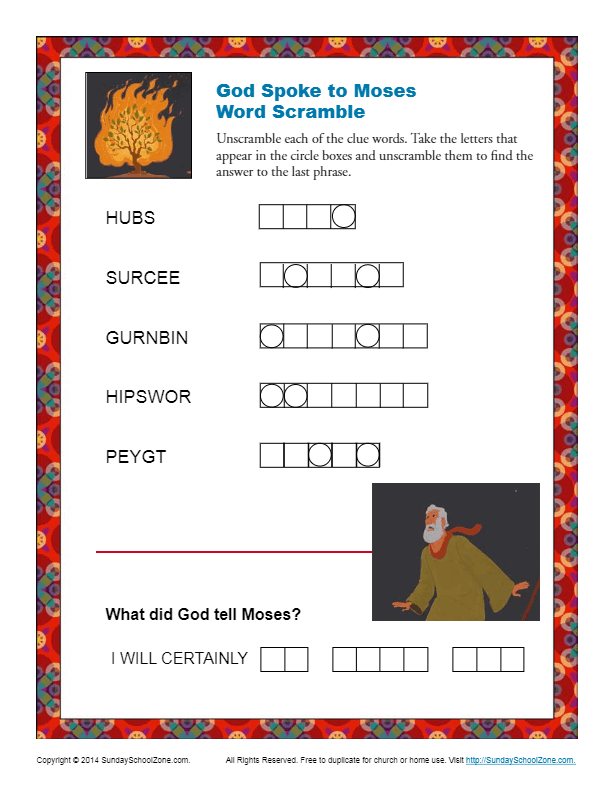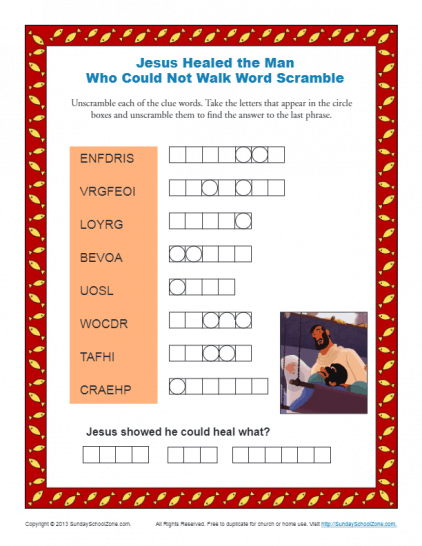

Nay, Allah raised him up unto Himself and Allah is Exalted in Power, Wise.
#Bible jumble words full
That they said (in boast), "We killed Christ Jesus the son of Mary, the Messenger of Allah" - but they killed him not, nor crucified him, but so it was made to appear to them, and those who differ therein are full of doubts, with no (certain) knowledge, but only conjecture to follow, for of a surety they killed him not:. The general Islamic view supporting the denial of crucifixion is similar to Manichaeism ( Docetism), which holds that only Jesus body was crucified but not his spirit, while concluding that Jesus will return during the end-times. The Quran maintains that Jesus was not actually crucified and did not die on the cross. One of the most famous differences is the Islamic view of Jesus' crucifixion. The stories are generally comparable, but there are differences. Stories related in the Quran usually focus more on the spiritual significance of events than details. The Quran mentions more than 50 people previously mentioned in the Bible, which predates it by several centuries. Main articles: Biblical and Quranic narratives and List of legends in the Quran Noting Ubay's perplexity and inner thoughts, Muhammad then told him, 'Pray to God for protection from the accursed Satan.' Comparison with biblical narratives He then asked Ubay to provide his own recital, and, on hearing the third version, Muhammad also pronounced it 'Correct!'. He made the same response when the second alternative reading was delivered. He asked first one-man to read out the verse, and announced it was correct. To resolve the question, the three went to Muhammad. Two men disputing a verse in the text asked Ubay ibn Ka'b to mediate, and he disagreed with them, coming up with a third reading. Tabarī prefaces his early commentary on the Quran illustrating that the precise way to read the verses of the sacred text was not fixed even in the day of the Prophet. Prior to this period, there is evidence that the unpointed text could be read in different ways, with different meanings. It was only with the introduction of Arabic diacritics some centuries later, that an authorized vocalization of the text, and how it was to be read, was established and became canonical. The early Arabic script transcribed 28 consonants, of which only 6 can be readily distinguished, the remaining 22 having formal similarities which means that what specific consonant is intended can only be determined by context. Muhammad, according to tradition, recited perfectly what the archangel Gabriel revealed to him for his companions to write down and memorize. Traditional view Īccording to Islamic tradition, the Quran is the literal word of God as recited to the Islamic prophet Muhammad through the angel Gabriel.

Because, according to his studies, Islamic scientific view on the date of birth of the Prophet until the second century A.H. A similar phrase is used by Lawrence Conrad for biography of Muhammad. Puin believed this to mean an ' evolving' text. The "subtexts" revealed using UV light are very different from today's Qur'an. 2.3 Influence of heretical Christian sects.


2.1.1 Narrative voice: Mohammed or God as speakers.1.6 Lack of secondary evidence and textual history.1.4 Extant copies prior to Uthman version.1.2 Comparison with biblical narratives.According to Toby Lester, many Muslims find not only the religious fault-finding but also Western scholarly investigation of textual evidence "disturbing and offensive". The most common criticisms concern various pre-existing sources that Quran relies upon, internal consistency, clarity and ethical teachings. In "critical-historical study" scholars (such as John Wansbrough, Joseph Schacht, Patricia Crone, Michael Cook) seek to investigate and verify the Quran's origin, text, composition, history, examining questions, puzzles, difficult text, etc. It has been subject to criticism both in the sense of being studied by mostly secular Western scholars and in being found fault with. The Quran is viewed to be the scriptural foundation of Islam and is believed by Muslims to have been sent down by God ( Allah) and revealed to Muhammad by the angel Rūḥ#As interpreted to refer to the Archangel Gabriel ( Jabreel). Criticism of the Quran is an interdisciplinary field of study concerning the factual accuracy of the claims and the moral tenability of the commands made in the Quran, the holy book of Islam.


 0 kommentar(er)
0 kommentar(er)
